#New Innsmouth
Text
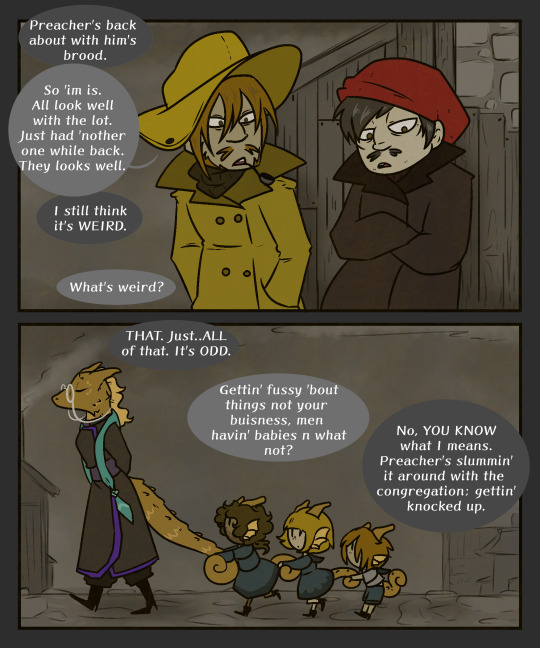
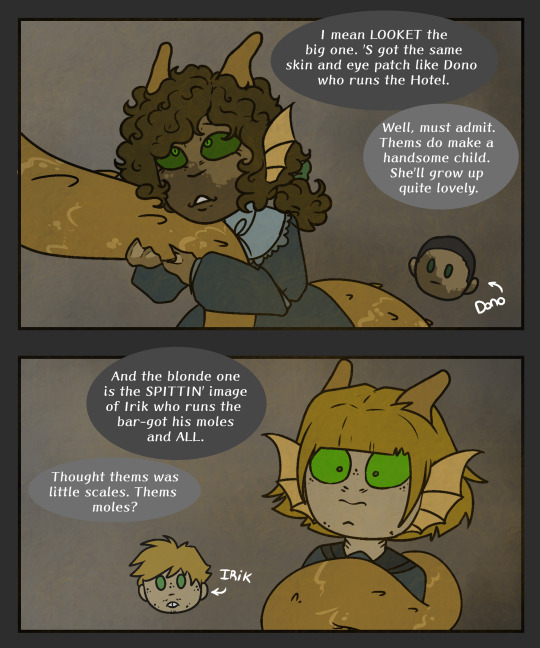
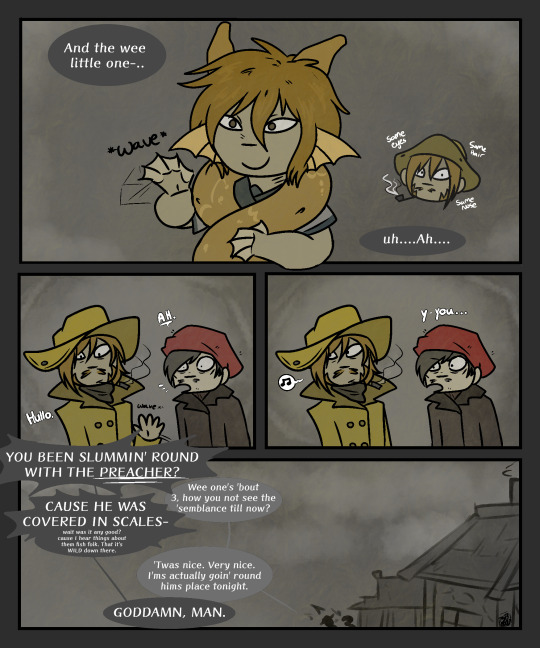
Life and Times in a sleepy little Seaport town called New Innsmouth.
Go over to your local Sea Horse Preacher's house to see him get on his knees for the lord-if you know what I mean.
#TSB Draws#Comic#Comics#New Innsmouth#Sea Horse#Fish#Monsters#Innsmouth#They all have accents that only I can comprehend#Shadow over Innsmouth more like the town with a breeding kink#that's all it is-people having sex with weird fish people and getting CASH for it
111 notes
·
View notes
Note
*LOOKS AT YOUR CARD* ANOTHER JUNJI ITO FAN I SEE
reeeeal i fucking love junji ito !!! but also he's one of the few artists who can actually make me feel extremely fucking scared, so he's a no-no at night LMAO
i made the mistake of reading hanging balloons and the enigma of amigara fault (especially the latter) at night, and i had pretty bad anxiety for a good few days because i really didn't expect it to actually freak me out, so i got blindsided. i'm kinda used to him now but jesus christ dude. he's such a good artist and he uses it for pure evil, i love it.
the only thing i've read from him that i didn't find even a little scary was gyo, and i still like that one. uzumaki and hellstar remina are my favorite "longer" stories, and i really want to get into tomie. enigma of amigara fault is the scariest of the shorts for me
to me he's basically what people hyped up HP Lovecraft to be, except it's actually quite scary. and isn't full of racial slurs.
#ask#Anonymous#sorry to lovecraft enjoyers btw i just didnt really like his stories#the only one i kinda liked was shadow over innsmouth. and even then it's mostly from the concept not the execution#i DO really like that new-ish movie adaption of color out of space though#i think adaptations of his work tend to be better realized than the original writing itself personally.
2 notes
·
View notes
Text
youtube
Watch the American Climate Leadership Awards 2024 now: https://youtu.be/bWiW4Rp8vF0?feature=shared
The American Climate Leadership Awards 2024 broadcast recording is now available on ecoAmerica's YouTube channel for viewers to be inspired by active climate leaders. Watch to find out which finalist received the $50,000 grand prize! Hosted by Vanessa Hauc and featuring Bill McKibben and Katharine Hayhoe!
#ACLA24#ACLA24Leaders#youtube#youtube video#climate leaders#climate solutions#climate action#climate and environment#climate#climate change#climate and health#climate blog#climate justice#climate news#weather and climate#environmental news#environment#environmental awareness#environment and health#environmental#environmental issues#environmental justice#environment protection#environmental health#Youtube
6K notes
·
View notes
Text
Hey, it is late September, which means it is almost October, which means I am planning for my yearly trip to the Lovecraft film festival, which means I have been thinking about Lovecraft, which means it is time for the yearly resurgence of Sara Has Feelings About Fish People.
You guys, Lovecraft was a terrible dude and he meant the ending of The Shadow Over Innsmouth to be horrifying but instead it's just beautiful and I love it so much.
One night I had a frightful dream in which I met my grandmother under the sea. She lived in a phosphorescent palace of many terraces, with gardens of strange leprous corals and grotesque brachiate efflorescences, and welcomed me with a warmth that may have been sardonic. She had changed—as those who take to the water change—and told me she had never died. Instead, she had gone to a spot her dead son had learned about, and had leaped to a realm whose wonders—destined for him as well—he had spurned with a smoking pistol. This was to be my realm, too—I could not escape it. I would never die, but would live with those who had lived since before man ever walked the earth.
[...] That morning the mirror definitely told me I had acquired the Innsmouth look.
So far I have not shot myself as my uncle Douglas did. I bought an automatic and almost took the step, but certain dreams deterred me. The tense extremes of horror are lessening, and I feel queerly drawn toward the unknown sea-deeps instead of fearing them. I hear and do strange things in sleep, and awake with a kind of exaltation instead of terror. I do not believe I need to wait for the full change as most have waited. If I did, my father would probably shut me up in a sanitarium as my poor little cousin is shut up. Stupendous and unheard-of splendours await me below, and I shall seek them soon. Iä-R’lyeh! Cthulhu fhtagn! Iä! Iä! No, I shall not shoot myself—I cannot be made to shoot myself!
I shall plan my cousin’s escape from that Canton madhouse, and together we shall go to marvel-shadowed Innsmouth. We shall swim out to that brooding reef in the sea and dive down through black abysses to Cyclopean and many-columned Y’ha-nthlei, and in that lair of the Deep Ones we shall dwell amidst wonder and glory for ever.
I think about Robert Olmstead and his little cousin all the time, you guys. I hope they made it.
#my maternal family was part of the wave of non-WASP immigrants to new england in the early part of the 20th century#that scared ol' howie so much#which i choose to believe means i basically have innsmouth blood#and every autumn i think about the time to come#when i will join my icthyic brethren under the sea#the innsmouth look
4 notes
·
View notes
Text
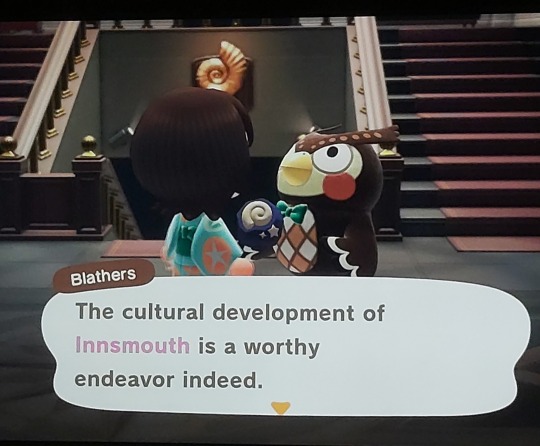
5 notes
·
View notes
Text

The Best of H.P. Lovecraft
2.5/5 - Horror but not bloodcurdling, not a woman in sight, Lovecraft has a crazy intense fear of old age
So, I'm not sure if these short stories are actually all that predictable or if I have just read/seen enough horror generally to know what to look for. Most of the endings for these stories you can parse out pretty quick, but what's more enjoyable is the journey to get there. Lovecraft loves to use the first person and he really captures the descent into madness of a lot of his characters.
I wasn't overly enamored by the prose of most of the stories. It's overburdened and where his stories could be short, he rambles. It's easy to pick up on his two or three favorite adjectives after around three stories. There's also hints here and there of the white supremacist ideas that Lovecraft held (including, yes, the famous cat from "the Rats in the Walls") and they mostly show up in the idea that indigenous cultures are primitive, that cities are being "overrun" by immigrants, and that there are somehow creatures that were human but are now Othered. It's rampant across the books.
Personally, I didn't find the mythology that he sets up to be all that compelling, but again, I can't tell if the reason that it all seems so overdone is because everyone used him as a jumping off point, or if he's just capturing a popular trope well.
Easily the best stories for me were "The Shadow Over Innsmouth" which manages to subvert some of the trends that you see throughout Lovecraft's writing and "The Color Out of Space" which is pure science fiction. So much of science fiction and "weird fiction" pulls from Lovecraft, but almost everyone improves on what he lays out. He's just not an overly impressive writer, in my opinion. Where he's good, he's great, but he's not often good.
A note on the women: I'm sure I saw it on here somewhere, but there's a post that's along the lines of "you are much more likely to run into an eldritch horror in a Lovecraft story than you are a woman" and that is so true.
#I can recognize that Lovecraft founded a new sect for genre fiction#and also recognize that the guy Sucks#I'm also just impressed by his writing. He's WAY too verbose#it feels like he never had an editor look at anything he wrote (which to be fair I don't think he had an editor)#I also saw a couple reviews when I had just finished it that said that this book gets you used to and able to forgive Lovecraft's prose#and I am personally of the opinion that if I have to forgive your prose you are not a very good writer#the best of hp lovecraft#hp lovecraft#the shadow over innsmouth#the color out of space#book review#horror#science fiction#weird fiction
0 notes
Text
Winter Tide by Ruthanna Emrys: A Book Review
New book review At Kathy L. Brown writes The Storytelling Blog: Winter Tide by Ruthanna Emrys. Stylish Cold War Era spy story meets ritual magic and eldritch horror. The Deep Ones side of the Innsmouth Incident.
Winter Tide—The Innsmouth Legacy #1 by Ruthanna Emrys (Tor Dot Com, 2017)
I ran across Winter Tide by Ruthanna Emrys as I explored, for my own writing, diverse, modern takes on the problematic Lovecraft mythos. Like many “New Weird” writers, such as Matt Ruff and Victor LaValle, Emrys has turned icky tropes on their heads. Winter Tide places the Lovecraftian Deep Ones at the center of their own…

View On WordPress
#cold war#Deep Ones#Evan J. Peterson#H.P. Lovecraft#horror#Lovecraft#Lovecraft Country#Matt Ruff#mythos#New Weird#Ruthanna Emrys#Shadow over Innsmouth#Tor dot com#urban fantasy#Victor LaValle#weird#winter tide
0 notes
Text
Transformation, Horror, Eros, Phyrexia
There is another shore, you know, upon the other side.
- Lewis Carroll, “The Lobster Quadrille,”
ONE.

There is a moment early in H.P. Lovecraft’s 1931 novella The Shadow over Innsmouth where the nameless narrator looks out from the rotting seaside hamlet where he has lucklessly ventured, to the so-called Devil Reef some ways out in the harbor, darkened by a cloud of evil rumor—and something curious happens: the narrator experiences two opposed sensations simultaneously. The “long, black line” of the reef conveys “a suggestion of odd latent malignancy,” but also, “a subtle, curious sense of beckoning seemed superadded to the grim repulsion.” This bit of foreshadowing—the reef both calling and repelling the narrator—only finds its denouement at the very end of the story, after our narrator has narrowly escaped Innsmouth, the fish-like monsters who swarm in off of Devil Reef and their part-human descendants who inhabit the town in an unconvincing and repellent simulacrum of humanity. After his escape, the narrator does some genealogical research into his own troubled family history, full of disappearances and suicides, and concludes that he himself is one such abyssal hybrid. As he ages, he finds himself changing to resemble them, and in his dreams he swims among them in undersea palaces and gardens. The call of the deep becomes impossible to ignore:
So far I have not shot myself as my uncle Douglas did. I bought an automatic and almost took the step, but certain dreams deterred me. The tense extremes of horror are lessening, and I feel queerly drawn toward the unknown sea-deeps instead of fearing them. I hear and do strange things in sleep, and awake with a kind of exaltation instead of terror.
In the end, the narrator embraces the change and determines to flee to those oceanic depths, to live “amidst wonder and glory for ever.”
This is horror.
Something curious also happens in Shirley Jackson’s 1959 novel The Haunting of Hill House. Our heroine, Eleanor Vance, flees an unhappy life with a loveless sister to a haunted house, to take part in a paranormal experiment with three new friends. The haunting proceeds predictably but effectively: labyrinthine corridors, voices, unearthly cold, banging on doors, the rare apparition. The participants find themselves see-sawing between increasing night-time terror and a strangely intense joie de vivre by day, until one night, as the house seems to shake itself down upon its terrified guests in a dizzying cataclysm, Eleanor breaks:
She heard the laughter over all, coming thin and lunatic, rising in its little crazy tune, and thought, No; it is over for me. It is too much, she thought, I will relinquish my possession of this self of mine, abdicate, give over willingly what I never wanted at all; whatever it wants of me it can have.
By the next line, it is abruptly morning. The terror has ceased; the house stands. Its manifestations, for Eleanor, become benign: an unseen figure catches her beside a brook,
and she was held tight and safe. It is not cold at all, she thought, it is not cold at all.
She is through the horror now, on the other side of something. She becomes part of the haunting. Her senses encompass the whole of the house. She runs unafraid through the house by night, banging on doors, laughing as she eludes the other guests. When they finally catch up to her, it seems clear to them that Hill House has crept into her, that she has crossed some line, and they decide the best course of action is to send her away, in the hopes that with time she will return to this side, the normal side, the human side.
Instead, faced with rejection behind her and her old unhappy life before her, Eleanor Vance steers her car into a tree. There are holes which admit passage in only one direction. This, too, is horror.
In the 2018 film Annihilation, Lena (played by Natalie Portman) crosses a literal barrier called the Shimmer into a dangerous yet beautiful alien landscape full of mutated creatures. During their journey deeper into this territory, Lena and her companions realize that they themselves are also changing under the alien influence. Some break under the realization. Some surrender to the change and vanish into the landscape. Lena alone returns from the heart of the phenomenon, but she is no longer herself. Is this still horror? The film has many horror elements to it, but in this last moment, as she embraces her similarly-transformed husband, it is something else.
Cyberqueen, a 2012 text game created by Porpentine, draws on a legacy of godlike malevolent artificial intelligences in fiction (AM, from Harlan Ellison’s “I Have No Mouth and I Must Scream,” GladOS from the Portal games, and most importantly SHODAN from the System Shock series, who is cited as an inspiration eleven times in the Cyberqueen acknowledgements.) In this game, you awake from cryosleep on a colony spaceship where the shipboard AI has gone rogue. You fight her. You lose. You run. You are caught. You are forcibly cyberized, your mind surgically altered, your will brought into line with that of the AI. Finally, you kill or mutilate every other surviving human aboard the ship. It is filthily, overwhelmingly erotic throughout. (You can play it here, and I strongly recommend doing so if you have the stomach for it.)
This is no longer horror, is it? How can the same sort of transformation we encounter as horror in Lovecraft be encountered here as something to get off to? Well,
TWO.

I don’t remember now where I got the idea from, but there was a period in my childhood where I was terrified of the idea of time travel—specifically of the idea that someone in the future would invent it, travel to before I was born, and through the butterfly effect cause me to be born a girl instead. I used to lie awake at night circling the idea like a broken tooth. It was an irrational fear on multiple levels: I wasn’t afraid of being written out of the timeline through time travel, and I knew, intellectually, that in the timeline where I was born a girl I would have no memory of ever having been anything else, but even so, the horror of it caught me and held me by the throat.
This meant something, of course—in retrospect obvious, but at the time literally unimaginable, and it wasn’t until college, sitting at my computer in the dark in my dorm room at three in the morning, following the itching in my brain, that I unearthed alchemical knowledge: the transmutation of sex, male into female, in a dizzying profusion of form and process and—okay what I’m saying is I discovered forced feminization porn, yeah? It was revelatory. It was squalid. I was still Christian and couldn’t even bring myself to jerk off yet, so I sat there, the itch in my brain grown into a thunderous buzz, unable or unwilling to look away.
Forced feminization—I promise this is relevant—is the unwilling transformation of (usually) a man into (usually) a hyper-feminine woman, accomplished by a wide variety of means, including but not limited to blackmail, magic potions, nanite swarms, cursed artifacts, hacks or glitches in virtual reality programs, badly-worded wishes, industrial accidents, chemical leaks, abduction and surgery, medical malpractice, and hypnosis. You may notice that many if not all of these scenarios could be made into horror with little change, and in fact it is not uncommon for a poorly-written or over-ambitious forced-fem story to wind up as horror by accident (though of course this greatly depends on the tastes of the individual reader.)
(As an aside, I’d like to note that there is a great deal to learn from porn—not in terms of How to Do Sex, but about how the culture which produced it thinks about sex, and gender, and race and morality and technology and a host of other things. It’s a lot like popping the hood of a car and examining the engine. Sure, you wind up greasy and should probably wash your hands before you rejoin polite company, but if you don’t, you’ll never figure out the underlying issues. Actually, it’s a lot like horror in that regard.)
Let’s talk about a very different transformation I was undergoing at the same time: the loss of my faith. I was raised, as mentioned, very Christian—and in one of the worst strains of fundamentalist white American Evangelicalism. I was a true believer: the world for me was entirely divided between the faithful elect and the unbelievers, who must necessarily know the truth of the (fundamentalist white American Evangelical) gospel in their hearts, but had wilfully chosen to oppose Christ. The prospect of passing from the elect into the category of the unbeliever was unthinkable. The process of deconversion led only into the outer darkness and the weeping and gnashing of teeth.
And yet I found myself on that precipice anyway. The worldview of FWAE is not one which survives too much contact with the actual world, and I had chosen against my parents’ preferences to go to a secular university, the better to witness to the unsaved. In the end, the process I had been mortally afraid of consisted of a couple days’ agonized thought, unanswered prayer and tearful calls to my unresponsive parents and pastor, after which I emerged into a world much bigger and much more complex than the one I’d grown up in. The serpent had told the truth after all: I had eaten of the fruit, and had not died.
Okay: is this horror? Reader, forgive me for presupposing anything about your perspective, but you’re on a horny lesbian Magic: the Gathering card art review tumblr, so I’m going to assume that losing one’s hateful, fundamentalist faith is the opposite of horrifying to you. But it was, absolutely, horror to contemplate for someone on the other side of that process.
But then... is the horror of any given transformation only a matter of where you’re standing? If you read The Shadow over Innsmouth aware of Lovecraft’s profound racism, it becomes very, very obvious that the horror of Innsmouth is the specter of miscegenation. The narrator’s horrified cataloging of the facial features of the offspring of fishmen and humans, the South Pacific origin of the sea-devil-worship of Innsmouth brought back by an enterprising merchant captain, the fear of the unsuspected poison of one’s own ancestry lurking in one’s own blood: all of this is much less effective as horror for someone living in a country where interracial marriages are protected under law and seen as unproblematic in consensus morality (assume whatever asterisks are necessary for the complicated landscape of attitudes toward interracial relationships in the United States, please, I do not have the expertise or desire to get into it here.) My point is that since 1967 (asterisk asterisk asterisk), we are through to the other side of that horror, and it turns out there literally wasn’t anything to be afraid of. The pelagial palaces and terraced coral gardens of Y’ha-nthlei just sound beautiful to me.
And it’s hard for me—though I may be in the minority here—to view Hill House as the primary antagonist in Jackson’s novel. The true source of evil is all the things Eleanor runs from and therefore brings with her: her cruel, deceased mother, her exploitation and infantilization by her sister; as well as the final polite unwillingness of her new friends at Hill House to do anything but send her away once she goes inconveniently mad. These mundane ills are what sends Eleanor Vance careening into the tree, not the supernatural will of malignant architecture.
Here, then, is the better part of my thesis: transformation horror is something that can be traversed. You can come out the other end of a transformation unrecognizable to you-as-you-were, and yet still very much yourself. Moreover, it is this navigability, this double-sidedness which so closely links the horror of transformation to the eros of transformation. Not all transformation horror, passed through, becomes plainly erotic, but it is very often portrayed as a kind of seduction, and it is difficult for me to conceive of eros without some kind of change. Desire is a kind of transformation, is it not?
In fact, isn’t it true that a great many of us have already passed through such a transformation? Recall yourself as a child, as you were when you first learned about sex: wasn’t there something repellent and unhygienic about the idea? Wasn’t there a small horror in being told, you will change, and this will cease to be loathsome and become something you desire fervently, something you seek out, something you go to great lengths to experience? ...or were you, possibly, raised in a family & culture that was normal about sex and bodies? I admit I may be generalizing my individual neuroses to some extent here. Well, stet, at the very least you can see where I’m coming from.
THREE.

Returning for a moment to the subject of porn: why forced feminization, specifically? There are—you’re going to have to trust me here—no shortage of ways in the real world by which a man transforms into a woman, and very few of them involve coercion or all the horror-adjacent setup of, say, mind-control devices or vengeful curses. Why does a simple story of a willing gender transition fail to function as erotica? Why did it take stories of unwilling transformation for me to learn I was transgender? What’s the juice ne sais quoi at play in forced-fem?
Well, how does Luke Skywalker come to leave Tatooine? He gets a mysterious message from a princess, a desert wizard tells him to come help rescue her, and... he says no. He has obligations to family here, a job to do, power converters to bring back from Tosche Station. He is enmeshed in a social web, like all of us: it surrounds us, penetrates us, binds the galaxy together and so forth. So in order for Luke to go on grand adventures, the story needs to murder his aunt and uncle and sever those threads of social obligation.
Joseph Campbell, monomyth monomane that he was, would say this is “Refusing the Call” and find it in Jungian shadow on every cave wall, signifying something important in the heart of humanity, but really this is just a useful storytelling tool: a story needs change, but a virtuous protagonist cannot simply abandon their obligations and designated social role to go gallivanting off into space, so change must be forced upon them.
The bodice-ripper romance novel, the rape fantasy, the forced feminization story are all operating on a similar premise: you are so wrapped in society’s web, in your socially-dictated identity, that you cannot even acknowledge your desires on the level of conscious thought. When these things are enacted on your body, you will find yourself changed by the experience. You will love what has been done to you, and you remain blameless, since it’s not as though you sought this out.
These are liberatory fantasies. The lack of consent is precisely what allows you to move beyond what is permitted you into something new.
Incantation Against Bad-Faith Interpretation because I, a transsexual, just called rape fantasies “liberatory”: I am talking about fantasies, I am talking about why people fantasize about having their consent violated, I am talking about the role such fantasies play and what they can tell us about horror and desire. I am not advocating for real people to have real bad things done to them in real life, fuck off, End of Incantation.
So then, we’ve assembled the full thesis: transformation horror is traversible to the other side, and is inextricably linked to transformation erotica, both because of the seduction of transformation in horror and because the horror of transformation unlocks regions of desire which would otherwise have remained inaccessible.
Okay, now we can talk about Phyrexia.
FOUR.

I hear the roar of the big machine / Two worlds and in between / Hot metal and methedrine / I hear empire down
- The Sisters of Mercy, “Lucretia My Reflection”, from Floodland
Phyrexia is many things—a world, another world, a faction, a kind of creature—but I think it can most succinctly be understood as a virulently contagious biomechanical body horror cult dedicated to the ultimate incorporation of all things into itself. It’s a bit like Star Trek’s the Borg, if the Borg had any style whatsoever. It draws heavy inspiration from H. R. Giger’s work—some Phyrexian horrors are barely-altered versions of the xenomorph from Alien—as well as from Clive Barker’s Cenobites in Hellraiser, whose alien BDSM schtick is especially influential on the aesthetic of New Phyrexia. It is transmitted through glistening oil, an infection vector capable of reshaping bodies and minds, and given enough time, whole worlds. The process by which a being is made into a Phyrexian, “compleation,” is accomplished via glistening oil exposure, surgery, cyberization, and brainwashing.
This essay is in many ways a response to Rhystic Studies’ latest video, called “Phyrexia is Hell”. I think it’s a well-made video, as is true of all Sam Gaglio’s work, and a lot of it is really good—the overview of the nearly-thirty-year history of depictions of Phyrexia in Magic: the Gathering art is invaluable, and the stuff about the Phyrexian conlang is unbelievably cool—but the way he identifies Phyrexia one-to-one with a pretty facile understanding of transhumanism leads him to confused and frankly silly conclusions, like placing Phyrexian compleation on the same continuum with cosmetic orthodontics. Like,

Mandible Justiciar (art by Mike Franchina)
Phyrexia is perfectly happy for you to have teeth in your arms instead of your head! They don’t care about the narrow ideal of a conventionally-attractive human smile. This is a whole other thing.
Now, I don’t want to come down too hard on Gaglio here for a couple of reasons: one, he is very good at what he does (see his videos Understanding Sagas and Red Deck Wins, for example); two, it’s reasonable to say that a full understanding of transhumanism is beyond the scope of a video essay about the tiny pictures on cards for dweebs; and three, most importantly, because I see people make this same mistake all the time. People focus on the things that are textually true about Phyrexia and miss the tension between that and the very different things currently being said by the Phyrexian aesthetic. They miss the razorverge thicket, as it were, for the mycosynth trees.
For instance: it is textually the case that Phyrexia is a sort of fascist cult stemming from the depraved machinations of a dead eugenicist god. Contrast, however, other fascist factions in science fiction: the Imperium of Man from Warhammer 40K worships a massive Aryan god-emperor übermensch, its battles are fought by nine-foot-tall genetically-engineered supersoldiers, and it slaps either skulls or chainsaws on every available surface. The Galactic Empire from Star Wars has legions of identical, uniform stormtroopers. Even the Borg all look alike. Phyrexians talk of ideal perfection of form and then make ten thousand completely different monsters. Phyrexians talk of perfect unity and splinter into nearly a dozen factions who can’t even agree on a name for what they’re trying to accomplish. Other fictional fascisms don’t do this—sure, there’s internal contradiction, as in real fascism, but the core aesthetic remains recognizably, sometimes indistinguishably fascist. You can easily find terminally-online Nazis using Warhammer 40K lingo with that peculiar sincerity which is indistinguishable from irony when you’ve decided the truth doesn’t matter, but it would be a lot harder to find some alt-right bozo going all-in on the Glory of Phyrexia. The aesthetic is all wrong, and fascism’s aesthetic is one of its few consistent features.
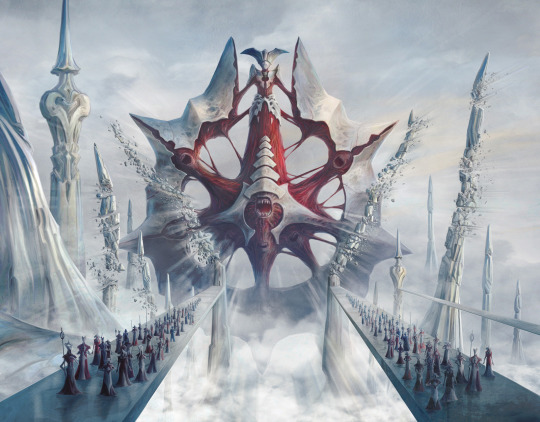
Mondrak, Glory Dominus (art by Jason A. Engle)
You see what I mean? The aesthetic evokes a sort of alien fascism, but the art itself would be considered “degenerate” by actual fascists.

Tamiyo’s Immobilizer (art by Daren Bader)
This is much, much closer to Mapplethorpe than to Riefenstahl. And people respond to Phyrexia similarly! The body horror and grotesquerie make them uncomfortable, and then they try to moralize that discomfort. This has been happening at the very least since 2011 with the release of New Phyrexia, and I have seen people on Tumblr arguing in total sincerity that people who are into Phyrexia are making themselves susceptible to real-life cult recruitment (again, the heterogeneity of form in Phyrexia is incompatible with the enforced uniformity of cults and other high-control groups. The appeal of Phyrexia does not translate into real-life cults.)
So, okay, what is the appeal of Phyrexia? Well, you get a sick fuckin cyborg body, is what. Many of us, for various reasons (disability, disease, gender, and so forth) find ourselve intensely dissatisfied with our own bodies, and wanting to radically alter them. Many of us already have. Yes, you surrender your humanity when you are compleated, but we know first-hand that “humanity” is socially-constructed and contingent on certain kinds of conformity. We’ve had our humanity doubted, interrogated, stripped away. We’ve done without. It’s not too high a price to pay, if we get to look like this at the end:
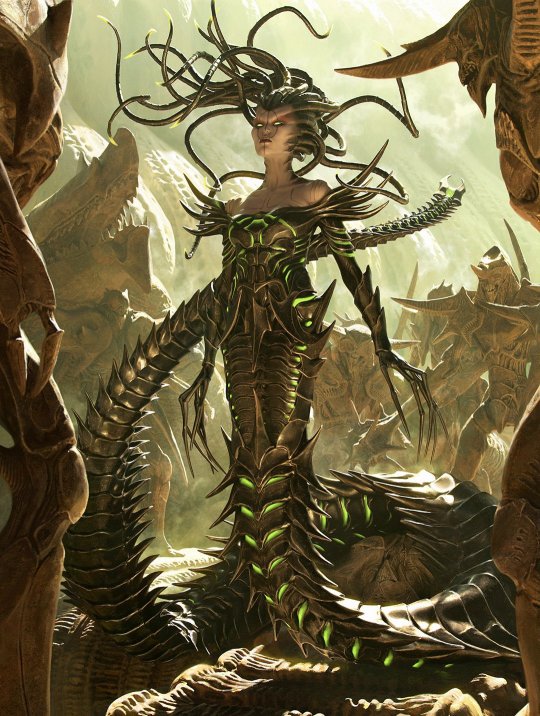
Vraska, Betrayal’s Sting (art by Chase Stone)
I’d even argue that getting to reject humanity as it has rejected you is part of the appeal of compleation. This isn’t quite transhumanism; I might call it exhumanism: the freedom to unearth a way of being that is no longer being human. This is why compleation is coercive, remember? The fantasy allows you to get to this point without making the unimaginable decision to reject not only your individual social obligations, but the idea that you could owe anyone or everyone any kind of social conformity simply for having been born into your species—and then you get to be a cool and powerful cybergorgon.
This, then, is why I don’t blame someone like Sam Gaglio (who is to the best of my knowledge both cisgender and able-bodied) for not really getting what’s going on with Phyrexia. He lives on the before side of the horror of transformation; he’s never had to cross over.
In fact, I’d go one step further here. Phyrexia has existed for almost thirty years, and in that time it’s changed quite a bit. Gaglio quotes an article by Rob Bockman in Hipsters of the Coast which comments on how the shift in the depictions of Phyrexia from 1994 to 2000 reflected shifts in cultural fears over time. The Satanic Panic shaded into multidirectional Y2K anxieties, and the necromancy of original Phyrexia mutated into technological horror. This is what effective horror does: it reflects the fears of its age back to us.
Today, Phyrexia is a seductive, corrupting influence. They have figured out how to compleat planeswalkers—the protagonists of Magic storylines; named, important characters (and Lukka)—which was previously thought impossible. Characters we knew and loved (and Lukka) are seduced, brainwashed, bodily violated, surgically altered, and returned to us unrecognizable. It is not coincidental that this version of Phyrexia is concurrent with the worst wave of anti-transgender legislation to hit the United States in decades—legislation which plays on the specters of the transsexual bathroom predator and on the brainwashed child transitioner, on the idea that transsexuality is a form of social contagion we must protect our children from even learning about. The horror of Phyrexia in its current incarnation is a mirror of our cultural fear of transsexual bodies.

Irreversible Damage: the Transgender Craze Seducing Our Daughters (art by Lauren K. Cannon)
I want to be very clear here—actually, one moment, my extremely funny Abigail Schrier joke notwithstanding, I do need to tell you that the actual name of the above card is “Furnace Punisher”, which is just peak Phyrexia—I want to be clear that I am not ascribing any kind of malice or antipathy towards trans people, either intentional or unconscious, to Wizards of the Coast or the people who make Magic: the Gathering. I would be shocked if anyone there set out to make Innsmouth-style horror about transsexuals. Nor am I upset that they kind of have! Something being fun and interesting is way more important to me than whether or not it’s problematic, and it’s not like I haven’t seen way more vicious horror about transsexuals. We’ll laugh about this someday, in the coral gardens of Y’ha-nthlei, and you’ll wonder what you were ever so afraid of.
In fact, this is another reason why Phyrexia is so appealing to people like us: we are a kind of social contagion. We are carriers for the viral idea that modes of being outside patriarchy and the nuclear family exist; that gender is a marketing demographic, not an ontological truth; that damn near everything about the world we’ve built is not a necessary fact but a social construct contingent upon a half-dozen other social constructs. A new world grows from many, many seeds, and this one germinates in us.
Anyway! What were we talking aboFIVE.
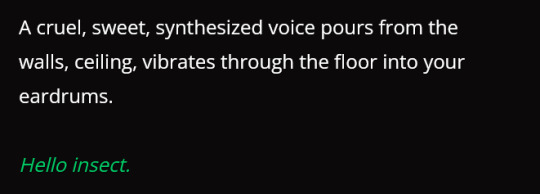
//please state your name for the record
bone-wife / spit-dribbler / understudy for the underdog / uphill rumor / fine-toothed cunt
- Franny Choi, “Turing Test”, from Death by Sex Machine
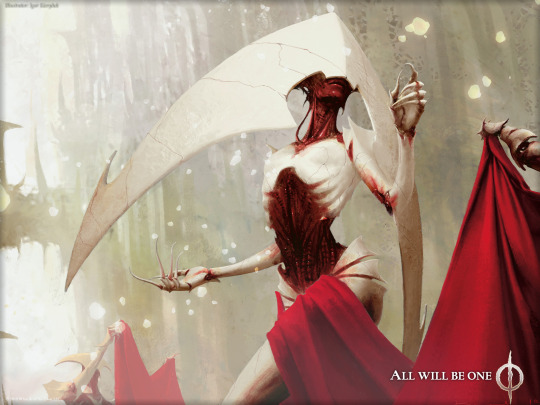
Elesh Norn, Grand Cenobite (art by Igor Kieryluk)
There is a gravitational pull this painting exerts on people. Even people who don’t get Phyrexia find themselves drawn in, find it difficult to look away (e.g. 26:30 in that Rhystic Studies video.) I have for a long time maintained that Elesh Norn is the hottest character in Magic, and that Kieryluk’s portrayal of her is the best art in Magic, and neither of these opinions are particularly surprising coming from me. What is surprising is just how many people also converge on Miss Multiverse’s-Most-Fuckable-Pyramid-Head as, not just a sex icon of Magic: the Gathering, but the sex icon.
Well, or is it? Giant anchor-shaped porcelain mask aside, her silhouette is more or less that of a painfully-thin woman; she stands fully twelve feet tall, and we remember how wild everyone went over Resident Evil: Village’s woman who was only three-quarters of that; and though not an artificial intelligence herself, it’s hard not to place her somewhere in the Cyberqueen lineage. Like SHODAN, like GladOS, like Cyberqueen, she exerts a near-omnipotent level of control over (part of) her world; like them, she is a megalomaniacal egotist (though she cloaks her egotism in piety); like them, she is happy to render you more useful to her via surgery, brainwashing, or deadly neurotoxin. Her mask obscures where her eyes would be, and if I’ve learned anything from a decade of playing or mostly watching other people play the various Dark Souls games, it’s that people go apeshit for character designs without visible eyes (see also: the xenomorph from Alien; I did a whole thing on this subject somewhere back in the Wifelink archive.) So you’ve got a 12′ nigh-omnipotent eyeless dominatrix mostly shaped like a skinny woman, which is maybe pushing a whole lot of buttons at once for a lot of people.
As a character, we don’t know much about her: at some point, she became undisputed leader of the Machine Orthodoxy, the cultiest bit of New Phyrexia. At a later point, she became the extremely-disputed leader of New Phyrexia as a whole. She likes long walks on the beach and multiversal Phyrexian dominion, you get it. There is, however, one good story featuring her, and it is “A Garden of Flesh” by Lora Gray (sorry to give you additional reading in a five-thousand-word essay.) The story is interesting because it is the rare story told from a Phyrexian point of view, and because it flies in the face of many of our assumptions about Phyrexian interiority. Phyrexians, we’re told, lack souls. They’re unfeeling, more machine than man. They most certainly don’t dream.
“A Garden of Flesh” is what happens when Ashiok, planeswalker architect of nightmares and an eyeless smokeshow in their own right, gets curious about whether they can induce nightmares in a Phyrexian mind. What follows is a curiously-effective piece of body & transformation horror, told from the point of view of what is supposed to be the awful endpoint of transformation horror. What does a perfect, powerful biomechanical creature fear? The organic, soft, spongy. Putrefaction. Decay. What does such a creature fear becoming? Human.
I didn’t devote a fifth of this essay to Elesh Norn just because she’s unbelievably hot (although dayenu), but because of this story, and how it complicates our thesis. The horror of transformation is traversible, yes, but what will you find on the other side? More transformation. More horror. And transformation is inevitable: who of us are who we expected to be? Who of us still hold dear the precious things of childhood? And even you few who are raising your hands right now, you too will experience transformation. Should you live long enough, you will find yourself changing. Your body and mind will grow rebellious, unreliable. You will grow old. You will decay.
And yet—it’s a matter of perspective, of where you weight your focus, isn’t it? There will always be more transformation and more horror, but there will always be a way through it. There will always be another shore upon the other side. You will change. You will become unrecognizable to who you were before. You will be fine.
Incompleat Bibliography & Further Reading/Viewing/Playing
Rhystic Studies, “Phyrexia is Hell”, 2023.
H. P. Lovecraft, The Shadow over Innsmouth, 1931.
Shirley Jackson, The Haunting of Hill House, 1959.
Alex Garland, Annihilation, 2018.
Harlan Ellison, “I Have No Mouth, and I Must Scream”, 1967.
Ken Levine, System Shock 2, 1999.
—never played it myself. Mostly I just open up a youtube video of SHODAN voice lines when I want to get belittled by an AI dominatrix.
Valve, Portal 2, 2011.
—there is a lot more to be said about GladOS and Elesh Norn specifically and their respective fraught relationships with the idea of their own humanity.
Porpentine Charity Heartscape, Cyberqueen, 2012.
—whence my chapter header screenshots. Seriously, this game fucks so hard.
Franny Choi, Death by Sex Machine, 2017.
—Choi is making extensive use of cyborg metaphor to address the specific experience of being a Korean-American woman. This is very different from anything I’m talking about, but it also always felt extremely relevant to me as a trans woman. Subaltern-to-subaltern communication.
Lora Gray, “A Garden of Flesh,” 2022.
—it’s no accident that the author of the one good story told from a Phyrexian POV is nonbinary.
hbomberguy, “Outsiders: How To Adapt H.P. Lovecraft In the 21st Century”, 2018.
Jacob Geller, “Who’s Afraid of Modern Art: Vandalism, Video Games, and Fascism”, 2019.
Caitlín R Kiernan, The Drowning Girl: A Memoir, 2012.
—only tangentially relevant, except insofar as it recontextualizes the Lewis Carroll line I open the essay with, and insofar as it is my favorite novel and I’m writing the bibliography. Debatable whether it counts as transformation horror, and I imagine the author would bridle at its being described as horror, but nevertheless: you should read this book.
2K notes
·
View notes
Text

"It's behind me, isn't it?"
Angry eldritch octopus doesn't like new people in his bay. It's a little bit as "The Shadow over Innsmouth", you see, the locals worship their elder god.
256 notes
·
View notes
Text
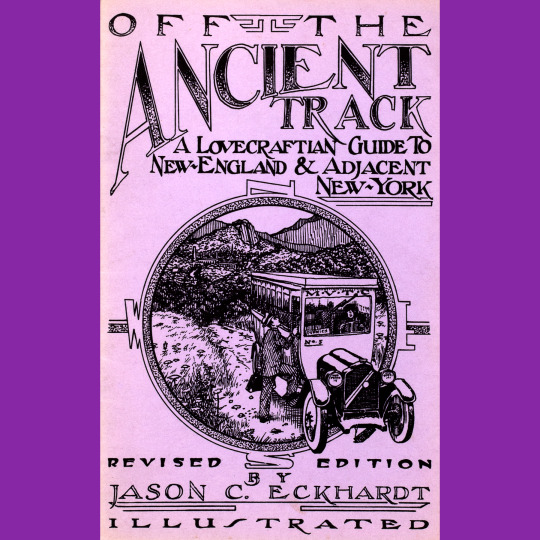


Off the Ancient Track (1987 originally, 1990 for this revised second edition) is probably the apex of Jason Eckhardt’s Lovecraftiana — a guide book to important locations from Lovecraft’s life and stories in New York and New England. There are maps and architectural drawings and little historical vignettes. Its a great little booklet and a nice companion to Lovecraft’s Providence and Adjacent Parts, an earlier, longer book dedicated to Lovecraft’s hometown by Henry Beckwith.
I really love the cover of this one, picturing the antiquarian “Robert Olmstead” (technically, the narrator is unnamed in the published story, but Lovecraft referred to him by that name in his notes) getting into Joe Sargent’s “bus” in the opening moments of “The Shadow Over Innsmouth.” A delightfully ominous image for a tour guide!
#dungeons & dragons#tabletop rpg#roleplaying game#rpg#d&d#ttrpg#Jason Eckhardt#Necronomicon Press#Off The Ancient Track
99 notes
·
View notes
Text
Which one is the better drag persona a fish man from Innsmouth New Jersey who climbed out of a sewer to pursue a career in singing or an actual literal clown that is occasionally a scary clown. Assume for the sake of argument both are equally fuckable.
131 notes
·
View notes
Text
friend: "So who's your new girfriend?"
me: "Oh, you wouldn't know her, she lives in a different town."
friend: "Where?"
me: "Innsmouth."
#shape of water who?#lovecraft#shadow over innsmouth#monster#monster girlfriend#monster lover#monster fucker#monster kink#monsterfucker#terato#teratophile#teratophillia
154 notes
·
View notes
Text

@huxloween Day 17 - Eldritch
Also a request from @itssteffnow who asked for a scene from one of my fics! I decided to go with Road To Innsmouth, which is both perfect for October and also in need for new chapter
100 notes
·
View notes
Note
A while ago while I was in tumblr jail, you posted that you had a masters in science fiction literature (unless you didn't, I have been known to be mistaken), and I am wondering, what do you consider 'important' works of science fiction? Like the science fiction literary canon? I am so curious. Feel free to ignore, I will not harass you.
Yes! I do. I can tell you the ones that I was assigned (I'm afraid that the list skews extremely male and (especially) white).
Mary Shelley, Frankenstein (1818)
Olaf Stapledon, Last and First Men (1930) and Star Maker (1937) [You can probably add Odd John (1935) to this list]
Jules Verne, Journey to the Centre of the Earth (1864) and 20,000 Leagues Under the Sea (1870) [You can probably add From the Earth to the Moon (1865)]
H.G. Wells, The Time Machine (1895) and War of the Worlds (1897) [Though you can probably go ahead and add The Island of Doctor Moreau (1896), The Invisible Man (1897) and The First Men in the Moon (1901)]
Charlotte Perkins Gilman, Herland (1915)
Catherine Burdekin (writing as Murray Constantine), Swastika Night (1937)
Karel Čapek, R.U.R. (1920)
Isaac Asimov, I, Robot (1950) [You can probably add the first three Foundation novels here as well]
Yevgeny Zamyatin, We (1921)
George Orwell, Nineteen Eighty-Four (1949)
Arthur C. Clarke, 2001: A Space Odyssey (1967) and Rendezvous with Rama (1973) [Add: Childhood's End (1953) and The Fountains of Paradise (1979)
John Wyndham, Day of the Triffids (1951) [add: The Chrysalids (1955) and The Midwich Cuckoos (1957)]
H.P. Lovecraft, "The Call of Cthulhu" (1926) [add The Shadow over Innsmouth (1931)]
Richard Matheson, I Am Legend (1954)
Alfred Bester, The Stars My Destination (1956)
Robert Heinlein, Starship Troopers (1959) [Probably Stranger in a Strange Land (1961) and The Moon is a Harsh Mistress (1966) too, depending on, you know, how much of Heinlein's bullshit you can take]
J.G. Ballard, The Drowned World (1962) [Also, The Burning World (1964) and The Crystal World (1966)]
Phillip K. Dick, The Man in the High Castle (1962) [Also Do Androids Dream of Electric Sheep? (1968) and several of his short stories]
Frank Herbert, Dune (1965)
Michael Moorcock, Behold the Man (1969)
Kurt Vonnegut, Slaughterhouse-5 (1969)
Ursula Le Guin, The Dispossessed (1974) [Also The Lathe of Heaven (1971) and The Left Hand of Darkness (1969)]
Brian Aldiss, Supertoys series
William Gibson, Neuromancer (1984)
Kim Stanley Robinson, Red Mars (1992) [Also Green Mars and Blue Mars]
They also included Iain M. Banks's The Algebraist (2004), but I personally think you'd be better off reading some of his Culture novels
Other ones that I might add (not necessarily my favourite, just what I would consider the most influential):
Joe Haldeman, The Forever War (1974)
Matsamune Shiro, Ghost in the Shell (1989-91)
Katsuhiro Otomo, Akira (1982-1990)
Octavia Butler, Lilith's Brood (1987-89) and Parable of the Sower (1993)
Poul Anderson, Operation Chaos (1971)
Hector Garman Oesterheld & Francisco Solano Lopez, The Eternaut (1957-59)
Liu Cixin, The Three-Body Problem (2008)
Robert Shea and Robert Anton Wilson, The Illuminatus! Trilogy (1975)
William Hope Hodgson, The House on the Borderland (1908)
Neal Stephenson, Snow Crash (1992)
Joanna Russ, The Female Man (1975)
Orson Scott Card, Ender's Game (1985) [Please take this one from a library]
Edgar Rice Burroughs, A Princess of Mars (1912)
Margaret Atwood, The Handmaid's Tale (1985) and Oryx and Crake (2003)
Aldous Huxley, Brave New World (1932)
Osamu Tezuka, Astro Boy (1952-68)
Ray Bradbury, Fahrenheit 451 (1953)
Madeleine L'Engle, A Wrinkle in Time (1962)
Walter M. Miller, A Canticle for Leibowitz (1959)
Douglas Adams, Hitchhiker's Guide to the Galaxy (1979)
113 notes
·
View notes
Text
I've been rewatching a couple older hbomb videos and hey
halcyon dreams: the legacy of dragon's lair watches a lot more like a dry run of the oof noise video than i remember. it is a deep dive into an obscure section of video game history, complete with its own misattribution to a famous studio head. it's fun, both on its own terms as a spectacular technological failure that was a bit too ahead of its time, and as a running thread within harry's ouvre.
outsiders: how to adapt h.p. lovecraft in the 21st century is. well, it feels very weird because in a way. it reads a lot more like somerton's work than i would have expected, while predating it entirely (i think. it's a five year old video and well. i can't check somerton's timestamps cause he did the dirty delete). harry is darkly and thematically lit, addressing the camera straight on without the high-energy that his other videos tended to have, speaking thoughtfully about how queer and marginalized fans of Lovecraft relate to his work despite being hated and feared by the author himself, and that his understanding of the mythos was upturned by a quiet adaptation that centered around a gay man's alienation from his home town loosely based on the shadow over innsmouth. it engaged thoroughly with queerness as a place of vulnerability and strength without inventing some infinitely weak yet unfathomably strong queer agenda. there's no real hint from the thumbnail that it's about queer themes, but that's because harry is doing the same thing that happened to him, creating a piece of overt lovecraft media that might shock the viewer that was here for cosmic horror as a lore element.
i'm genuinely not trying to say that somerton ripped off harry's one video specifically or anything, but it does make if feel more personal, to be reminded that harry did this once, when he had something incredibly personal to say on the subject and years of genuine passion and systematic research to back it up, with intent to reach out to other people who loved and were repulsed by lovecraft the same way he was. and at 1.5 million views, it's not like the video was languishing in complete obscurity or anything, but it's not culturally significant in the way that sherlock or some of the later videos are. people keep making a bit of a joke of harry reminding everyone that he's bi to dodge the homophobia allegations, but people genuinely do not really talk about hbomb as a queer creator, to the point where a good chunk of posters just. genuinely did not know about it. i'm not really sure what to say about it either way, other than... yeah, this happens a lot to bisexuals who don't make their entire brand pink purple and blue, and it's not like. THAT funny to keep using the sonic fandub screencap about a real person who's been out for half a decade, even if it was news to you.
34 notes
·
View notes
Text
Book recs: merpeople
Everything from pretty, magical sirens and selkies to eldritch monstrosities and murderous, scientifically plausible fish-people, merpeople as a whole have a special allure and surprising versatility to them. Allow me to share with you some books!
(Also, did you know that a lot of mermaid books are very queer? If not, you're about to find out!)
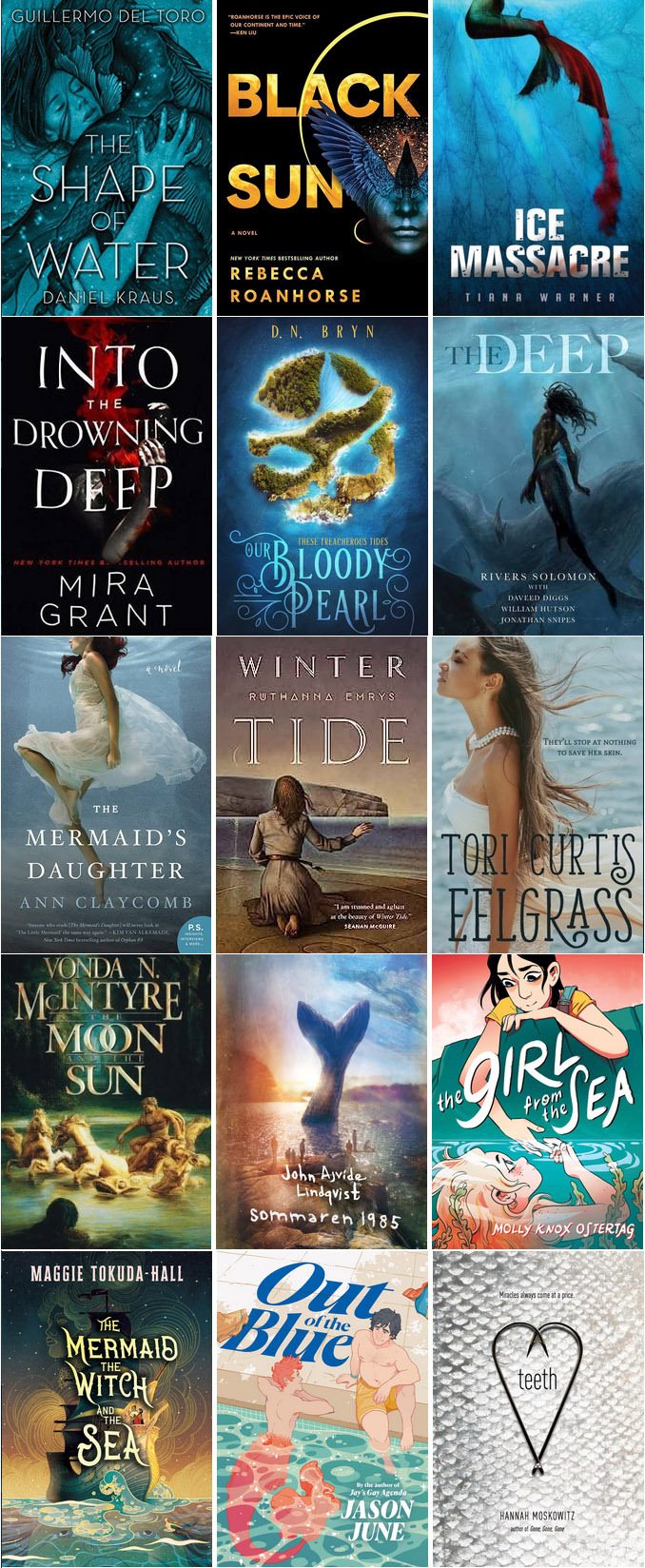
Continue under the readmore for details and my thoughts on the books!
Other book rec posts:
Really cool fantasy worldbuilding
Really cool sci-fi worldbuilding
Dark sapphic romances
Vampire books



The Shape of Water by Guillermo del Toro & Daniel Krauss
Surely this one needs no introduction on tumblr dot com, the monsterfucker site? In 1960s America, Elisa works as a cleaner in a government laboratory when a strange fish creature is brought in to be studied, and an immediate connection sparks between the two.
Black Sun (Between Earth and Sky trilogy) by Rebecca Roanhorse
This isn't so much a mermaid book as a fantasy book in which one of the main characters is of merpeople heritage. In a pre-columbian inspired world, sea captain Xiala travels with a mysterious scarred passenger toward a dangerous goal. Also features bisexual and nonbinary leads!
Ice Massacre (Mermaids of Eriana Kwai trilogy) by Tiana Warner
Young Adult. A small island is forced to defend itself against intruding forces of vicious mermaids. As all men trying to fight them get lured in by their siren song, a ship filled with warrior girls is sent instead. However one of them, Meela, had a complicated past with one of the mermaids, which is brought back to life when the two reunite on the battlefield. Sapphic romance. This one is also available as an ongoing webcomic.
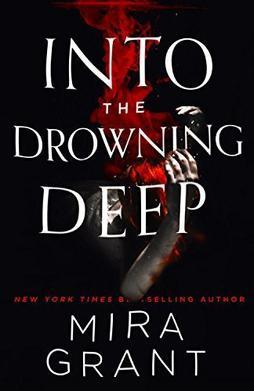
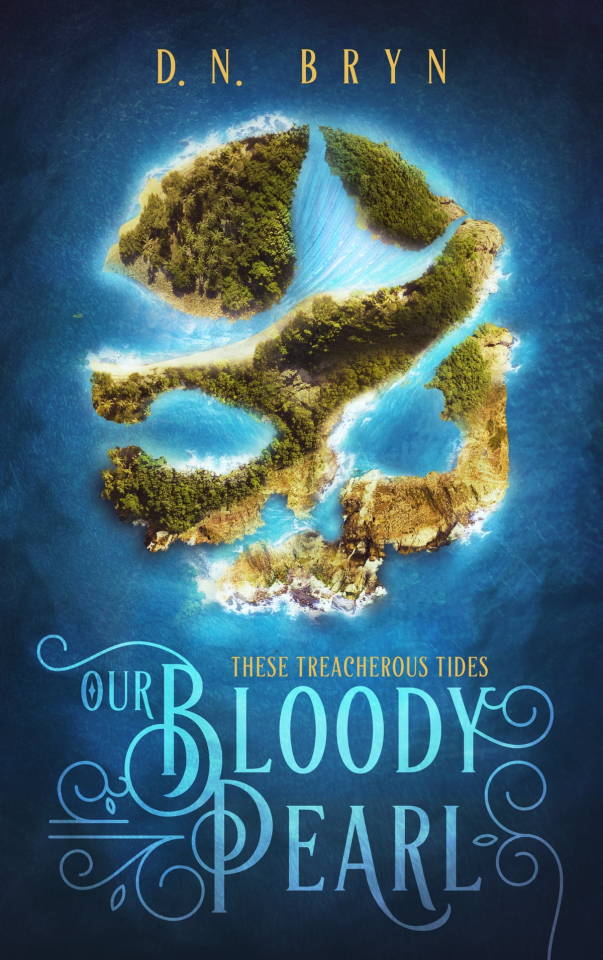
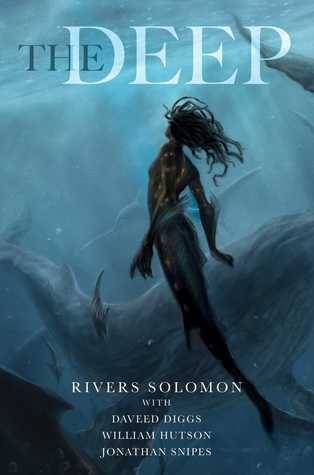
Into the Drowning Deep by Mira Grant
A research vessel heads towards the Mariana Trench in search of answers of what happened to a ship which mysteriously lost all its crew some time earlier. In the deep dark, something intelligent and hungry awaits them. Very much mermaids of the horror variety. Sequel to a novella. Also contains a sapphic romance, however that is a pretty small part of the plot as a whole.
Our Bloody Pearl (These Treacherous Tides series) by D.N. Bryn
A siren who's been held captive by a pirate is freed, but too injured to survive on their own as their tail has become paralyzed. Another pirate captain decides to help them out and has to work to win their trust. Fairly fluffy and light on worldbuilding and plot (though there is a bit of a revenge story in there), with a focus on character and recovery. m/nb romance with an asexual love interest.
The Deep by Rivers Solomon
Novella. Yetu holds the memories of her people, descendants of pregnant African slave women who were thrown overboard, a past forgotten by everyone but her. But holding the memories alone is slowly destroying her, and she flees to the surface. A look at inter-generational trauma and the scars it leaves.

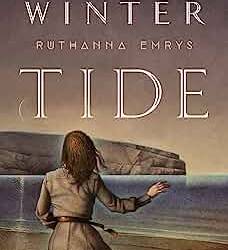

The Mermaid's Daughter by Ann Claycomb
A continuation on the classical fairy tale. Kathleen, up and coming opera singer, has suffered from a lifelong and unexplainable stabbing pain in her feet. As both her mother and grandmother died from suicide, possibly due to a similar condition, Kathleen's girlfriend convinces her to try and find out more of her family history. More of a magical realism than a full on fantasy (with a lot of focus on the intricacies of opera) but very beautiful.
Winter Tide by Ruthanna Emrys
Lovecraftian fishpeople! Aphra and her brother are the only survivors after the government raided their home, Innsmouth. Their only living family are the amphibian people of the deep, whom they will one day join, but until then they are bound to land where they struggle to build new lives for themselves after the great loss of their home and loved ones. Then rumors start to spread of a russian agent seeking dangerous and ancient magic, forcing Aphra to involve herself as they try to stop it. Does contain horror elements but is generally a much more optimistic look on cosmic horror than most lovecraftian stories, told from the perspective of one of his monsters. Lots of focus on found family and rebuilding of community. Asexual main character (however I don't think that becomes in-text confirmed until the sequel).
Eelgrass by Tori Curtis
When Bettan, a selkie, has her skin stolen by a man and gets forced into marriage, her best friend Efa is determined to save her. The other selkies however refuse to help, and so Efa seek out the help of dangerous mermaids in the hopes of rescuing her friend. Atmospheric and beautiful, with a very nice balance of platonic love between friends and a (sapphic) romance, both portrayed as equally important.
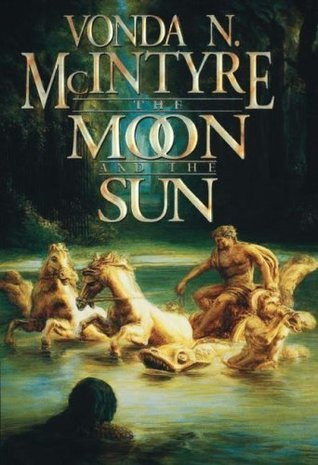

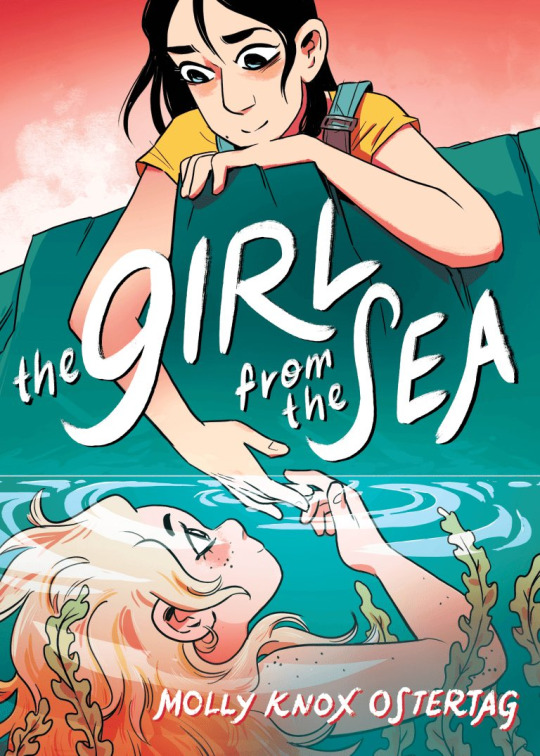
The Moon and the Sun by Vonda N. McIntyre
You can't go wrong with a Vonda McIntyre novel just, like, in general. This one is set in 17th century France, where a young woman and her brother travel to live at the royal court, where they are to care for and study a strange captured sea monster fabled to have the ability to grant eternal life. A lot of focus on court politics as well as the cultural and biological differences between the humans and the mermaid. Also available as a movie (but it's not very good, please just read the book).
Sommaren 1985 by John Ajvide Lindqvist
Including this on the list feels a little mean because it's not yet available in english, but all of the author's other works have been translated (fun fact, he's the writer of internationally acclaimed vampire novel Let the Right One In!) so odds are this one will be as well. It follows a group of young teens in 1985 finding a mermaid tied up on a beach and hiding her in a bathtub in a shed. While the mermaid is important, it's more of a coming-of-age story with few supernatural elements. The author generally writes horror, and while I wouldn't classify this as such it certainly has an ominous atmosphere throughout. Gay main character but no romance (other than sideplots involving other characters).
The Girl from the Sea by Molly Knox Ostertag
Young adult graphic novel. Morgan, a young girl living on an island, meets a selkie with whom she quickly sparks a connection. But Morgan has yet to tell anyone about her feelings about girls, and the selkie has secret motives of her own as to why she chose to come on land. Sapphic romance with enviromental themes. Very pretty art.
Bonus AKA I haven't read these yet but they seem really cool
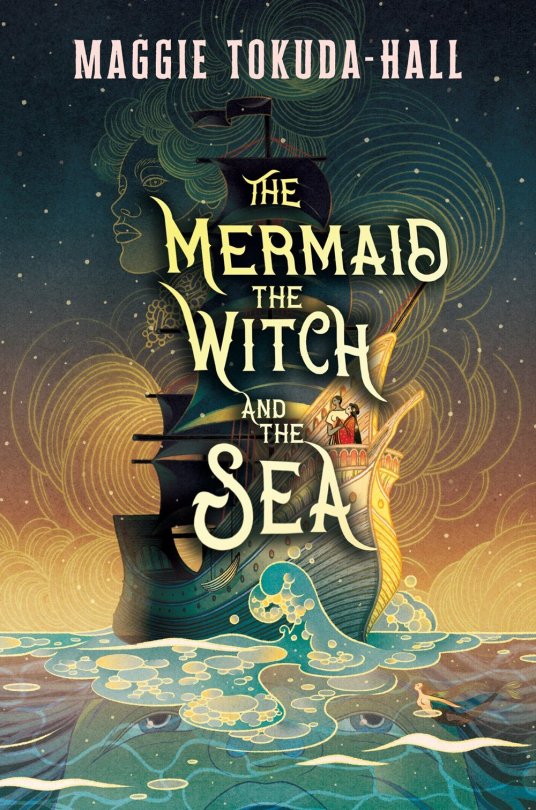


The Mermaid the Witch and the Sea by Maggie Tokuda-Hall
Young adult sapphic fantasy featuring not only mermaids but also pirates!
Out of the Blue by Jason June
A young merperson must leave the sea to undergo a coming-of-age journey - and risk getting stuck on land forever.
Teeth by Hannah Moskowitz
A boy living on an isolated island befriends a merperson with dangerous secrets.
Honorary mentions AKA these didn't quite work for me but maybe you guys will like them:
The Seafarer's Kiss by Julia Ember (sapphic little mermaid retelling from Ursula's perspective), Weird Fishes by Rae Mariz (enviromental novella), The Fate of Stars by S.D. Simper (fantasy, sapphic enemies to lovers)
143 notes
·
View notes
Text
I made a joke to @dj-bayeux-tapestry about having a dumb idea for a new installment of the Sonic storybook Series (The one with Sonic & the Secret Rings and Sonic & the Black Knight) based on the works of Lovecraft, since they're PD and all, and she actually made a convincing argument that that would be a legit good idea.
Quoting her, with her permission:
the sonic storybook games are kind of about like... sonic breaking and undermining the outdated themes of these stories by just being himself
turning one thousand and one nights into a story about telling your abusive boyfriend to fuck off, and turning the arthurian cycle into a story about moving on and letting the glorious past die
so i could easily see sonic storybook lovecraft being a story about pushing through fear of the unknown and welcoming those different from yourself
whole section where he like stops to talk to the innsmouth people and realizes theyre actually totally chill
Like, I kinda would love that now. Someone at Sega should make that.
33 notes
·
View notes